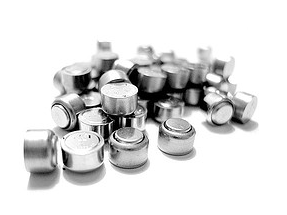Hearing aids of all styles and technology levels use Zinc-air batteries. Because hearing aids require a battery for power supply, it is important to know and understand how to best care for and best use your batteries. Please read below to discover helpful information, including hints and tips from major hearing aid battery manufacturers.
Zinc-air batteries are activated by oxygen in the atmosphere, which reaches the battery through small vent holes. Until they are ready for use, zinc-air batteries require a tab (sticker) to cover the vent holes and prevent dry out. Once the tab is removed, the battery activates at room air and is able to be used as a power supply for your hearing aid(s).
Hints & Tips:
Zinc-air batteries contain more energy than any other type of battery. Zinc is a critical component to the battery, as it provides longer battery life.
As stated by Kevin Kouba (2013) at Rayovac, “zinc-air batteries are best used soon and consistently after activation, because the battery begins to discharge as soon as the tab is removed; it is impossible to stop that discharge from occurring once you have removed the tab” (Article 12293). Hearing aid battery life begins when the tab is removed from the surface of the battery, regardless of whether or not the battery is being used in the hearing aid. It is important to keep the tab in place until you have need of the battery. Hearing aid batteries are best handled with clean hands, free of debris or heavy oils.
Kouba (2013) recommends letting the battery sit at room air for at least one full minute. Each zinc-air battery needs time to reach full activation (Article 12293). Many audiologists recommend waiting 2-3 minutes before using the battery, after removing the tab. Some research has shown that waiting as long as 5 minutes allows for an even longer battery life.
Similar to hearing aids, batteries are sensitive to temperature changes. Batteries are best stored at room temperature, away from extremely cold or extremely hot conditions. Hearing aid batteries should not be stored in the refrigerator, nor should they be stored in direct sunlight (Power One, 2016). Batteries left in environments with high humidity may absorb moisture, which can shorten battery life and lead to leakage. Additionally, it is best to store batteries in the original packaging or in a battery caddy, as other metal objects can short out the batteries (Rule and Kouba, 2013).
When not in use, it is best to open the battery door of each hearing aid. Even a slight opening of the battery door will help save battery life, as well as allow any moisture or humidity to evaporate out of the hearing aid and away from the battery contacts.
Your audiologist is able to answer any questions you may have regarding your hearing aid batteries. Follow these helpful tips and ask your audiologist for help when necessary. Good battery practices will help you achieve the best overall hearing aid experience!
Rule, A., and Kouba, K. (2013, December). Rayovac hearing aid batteries: Important things to know to ensure patient satisfaction. AudiologyOnline, Article 12293. Retrieved from: http://www.audiologyonline.com.
Varta Microbattery (2016). Care and Handling: Handling the hearing aid battery. Retrieved from: http://www.powerone-batteries.com/en/know-how/care-and-handling.
Posted on Thu, August 11, 2016 by Kara Mouzin, AuD filed under Hearing Aid Hearing Loss

